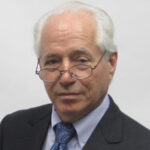Keeping the Nation Strong
Lee Swanger is a materials and corrosion engineer who dissects failure—why a gas line explodes or a crane collapses, for example. His work also helps prevent failure, solving critical material problems for clients like the US Navy, the US Coast Guard, and nuclear power companies.
For Swanger, giving to the Hertz Foundation supports innovation and progress, while preventing the United States from falling behind.
“There are other countries that support more graduate students in science and technology than the United States does as a matter of public policy,” he said. “Without organizations like the Hertz Foundation, the country’s competitive advantage in these fields would be eroded. The Hertz Fellowship is a really good way to ensure that our science and technology pipeline stays strong.”

Swanger’s latest gift, an endowed fellowship, was a consequence of his own challenge, he said. In 2017, Swanger established a $300,000 matching gift challenge to spur first-time donations and to motivate current donors to increase their giving. Inspired by the success of this challenge, another donor established the MEGAHertz matching challenge to create named and endowed fellowships. Swanger responded to that challenge by establishing the Lee A. Swanger Fellowship in Engineering and Applied Science.
“I had intended to do it in the future, but the challenge inspired me to do it now,” he said. “I hope that my gift motivates other fellows to recognize the importance the Hertz Foundation played in their careers and to pay it forward.”
As a graduate student at Stanford, the Hertz Fellowship was crucial for Swanger to complete his PhD. He had received two one-year fellowships, from IBM and Xerox Corporation, with no prospect of being able to renew either. Named a Hertz Fellow in 1970, he was able to continue research he started on spinodal decomposition, a mechanism by which a solution of two or more components can separate into distinct phases with distinctly different chemical compositions and physical properties— “like being able to decompose Italian salad dressing,” Swanger said.
With a colleague, he also conducted an analysis of an article on the nucleation of bubbles in blood (why deep-sea divers get the “bends”), correcting the research in an article of their own, which gained traction among groups like the Department of Defense.
Now principal engineer and director of the Miami office of Exponent, an engineering and scientific consulting firm, Swanger began giving back to the Hertz Foundation as an fellowship interviewer from 1982 to 2016. He started refusing the token honoraria the foundation gives to interviewers for their time and effort in the selection process. “I told the foundation, keep the honorarium for the foundation’s benefit,” Swanger said.
During his decades interviewing prospective fellows, Swanger encountered many students who met and even surpassed the rigorous standards of the program, but weren’t selected due to budget limitations. When the foundation changed its structure to accept donations, he was happy to step up.
“As an early contributor to the foundation, my goal was to start a cascading multiplier effect among the fellows,” Swanger said.
Endowed fellowships offer a personalized experience with long-term connections to the people and breakthrough research you’re supporting. Honor a special person in your life with this lasting gift.